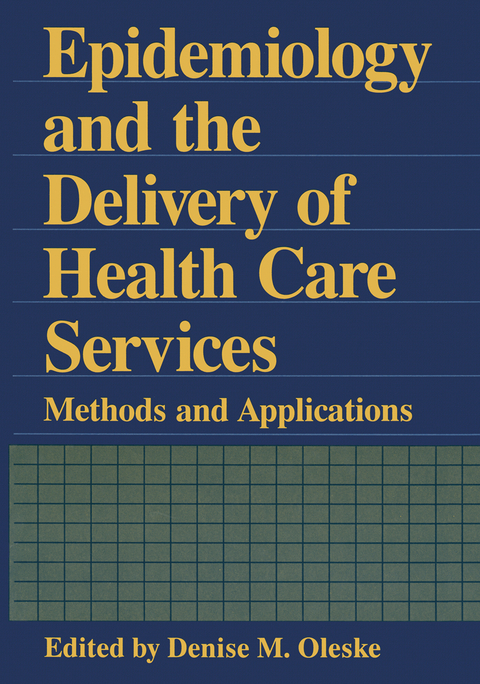
Epidemiology and the Delivery of Health Care Services
Springer-Verlag New York Inc.
978-1-4613-5745-2 (ISBN)
In this introductory textbook to epidemiology, students will discover the knowledge and skills required for managing population-based health care under health reform. Fundamental epidemiological techniques are presented teaching students to assess the health status of populations served; determine appropriate interventions based upon knowledge of factors which affect health status; and evaluate the impact of health care systems, programs, technologies, and policies on the health status of populations. Each chapter includes case studies and discussion questions.
1—An Epidemiologic Perspective for Health Care Management.- An Epidemiologic Framework for Health Services Delivery.- Brief History of the Application of Epidemiology in the Delivery of Personal Health Services in the United States.- Reasons for Applying Epidemiology in Health Services Management.- Feasibility of Using Epidemiology in Planning and Evaluating Health Care Services.- Summary.- Case Studies.- References.- 2—Measurement Issues in the Use of Epidemiologic Data.- Methods of Measurement.- Logistics of Measurement.- Reliability and Validity of a Measure.- Classification of Health Status.- Control of Measurement Error.- Summary.- Case Studies.- References.- 3—Descriptive Epidemiologic Measures.- Measuring the Frequency of Health Events in Populations.- Format of Descriptive Epidemiologic Measures.- Summary.- Case Studies.- References.- 4—Strategic Planning, an Essential Management Tool for Health Care Organizations, and Its Epidemiologic Basis.- Epidemiologic Basis of Strategic Planning.- The Theoretical Basis of Strategic Planning.- The Strategic Planning Process.- The Format and Content of the Strategic Plan.- Conclusions.- Case Studies.- References.- 5—Evaluating Health Care Programs and Systems: An Epidemiologic Perspective.- Conceptual Dimensions of Health System Evaluation.- Analytic Approaches to Evaluation: An Epidemiologic Perspective.- Prospects of Health Services Evaluation.- Conclusion.- Case Studies.- References.- 6—Control of Transmissible Diseases in Health Care Organizations.- Infectious Disease Concepts.- Managing Disease Outbreaks.- Blood-Borne Disease Transmission.- Airborne Disease.- Special Considerations in Infectious Disease Control by Specific Health Care Service Setting.- Conclusion.- Case Studies.- References.- 7—TechnologyAssessment.- Defining Technology Assessment and Its Function.- Categories of Technology.- Technology Life Cycle.- Targeting Technologies for Assessment.- How Is Technology Assessment Performed?.- Who Does Technology Assessment?.- Problems in Performing Technology Assessment.- Future of Technology Assessment.- Technology Assessment and Health Care Reform.- Summary.- Case Studies.- References.- 8—Epidemiology and Health Care Quality Management.- Theory of Quality Management.- Interrelationship between Health Care Quality Management and Epidemiology.- Quality Assessment.- Quality Improvement Techniques.- Improving System Performance.- Summary.- Case Studies.- References.- 9—Managing Health Care Systems from an Epidemiologic Perspective.- Application of Epidemiology in Managing the Delivery of Health Care.- Linking National or Regional Policy Initiatives with Local Health Systems.- Strategically Developing New Services or Planning Changes in Existing Ones.- Projecting the Human Resources Necessary to Provide Health Care to a Population.- Monitoring Institutional Performance with Respect to Population Health Status.- Measuring the Success of Institutional Linkages and/or System Configurations to Effect Changes in the Health Status of the Population.- Conclusion.- Case Studies.- References.- 10— Epidemiology and the Public Policy Process.- A Contextual Framework for the Relationship between Policy and Epidemiology: Public Health.- Public Policy: An Interactive Process.- The Interrelationship between Epidemiology and Public Policy.- Ethical Considerations of Policy Decisions and Their Relationship to Epidemiologic Data.- Summary.- Case Studies.- References.- Suggested Answers to Selected Case Studies Questions.
| Zusatzinfo | XV, 235 p. |
|---|---|
| Verlagsort | New York, NY |
| Sprache | englisch |
| Maße | 178 x 254 mm |
| Themenwelt | Studium ► Querschnittsbereiche ► Epidemiologie / Med. Biometrie |
| Studium ► Querschnittsbereiche ► Prävention / Gesundheitsförderung | |
| Sozialwissenschaften | |
| Technik ► Medizintechnik | |
| ISBN-10 | 1-4613-5745-4 / 1461357454 |
| ISBN-13 | 978-1-4613-5745-2 / 9781461357452 |
| Zustand | Neuware |
| Haben Sie eine Frage zum Produkt? |
aus dem Bereich


